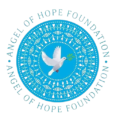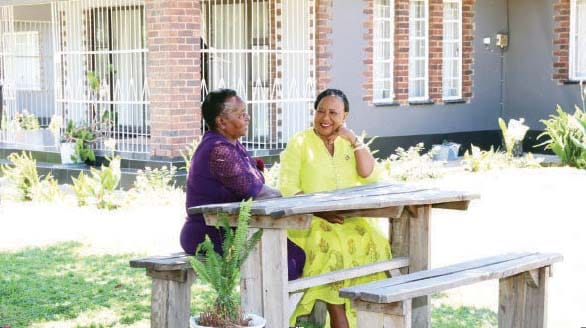Tendai Rupapa Senior Reporter
THE visiting First Lady of Botswana and her delegation were on Wednesday left awestruck at the high level of investment by First Lady Dr Auxillia Mnangagwa in empowering communities with resources and skills.
This has transformed the lives of many people, right from the grassroots level, who are now contributing significantly to the growth of the country’s economy.
The visitors were taken on a breathtaking tour of 71-year-old Gogo Getrude Mberi’s house in Waterfalls, an Agric4She beneficiary, where they witnessed inspiring projects that include poultry production, gardening and mushroom production at a small scale.
Ever energetic, Amai Mnangagwa is a woman par excellence and the empowerment of women and girls runs in her veins.
A few years ago, the First Lady launched a first of its kind urban transformational programme aimed at uplifting the less-privileged through income generating projects.
She opened community gardens equipped with drip irrigation to allow all-year-round production of crops and poultry project with 29 500 road runner chickens.
The mother of the nation also availed broiler chicks and feed for women, youths, the elderly, those with disabilities and widows as part of her nationwide empowerment programme.
Gogo Mberi a widow, became a beneficiary and has never looked back since then.
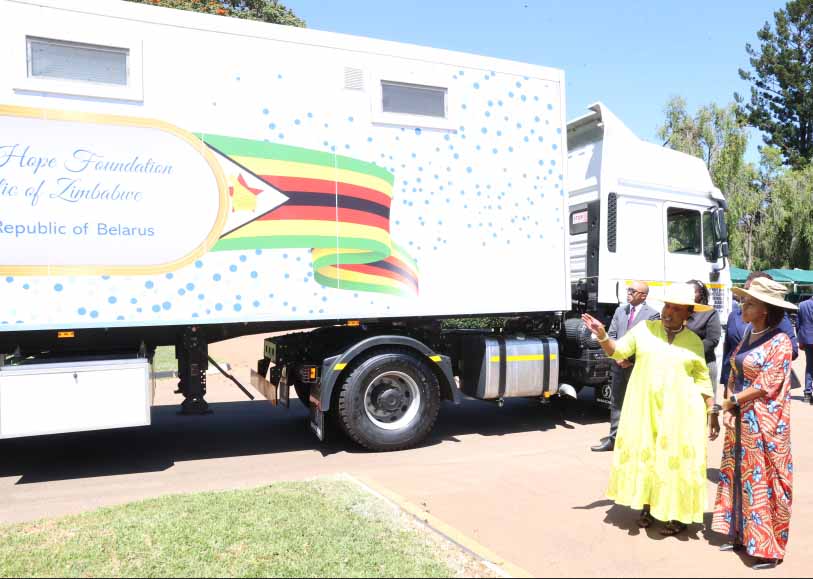
Through the projects, she has managed to build a house and bought vehicles for herself.
Mrs Mberi said she owed her success to the First Lady whose teachings she said are valuable and life changing.
“My place here in Waterfalls is also my place of work. I rear chickens, do gardening and also grow mushrooms. I am always occupied because there is always something to do all the time. I felt happy seeing Amai coming back here as she always do monitoring our projects and encouraging us to always work hard.
“She usually comes to see how I work and how I do things here. She is a mother who uplifts us as women especially widows. As the women of Zimbabwe, we are forever thankful. As widows, Amai is always telling us that broken crayons still colour and this keeps us going and pushing hard to do more,” Gogo Mberi said with a broad smile.
Mrs Masisi could not hide her elation and quipped: “We just saw beautiful projects here. A lady who is a widow didn’t give up when she was told by Amai that a broken crayon can still colour.
“Everybody is so inspired, we are also inspired. From the scientists, from the science perspective and the ladies from the Botswana community, we are all inspired with what we saw here at Gogo’s house.
“This broken crayon I can also use it at a personal level and I will show this broken crayon in my own country. This story is really about inspiration, inspiration and I maintain that inspiration because I have seen it first-hand. The evidence is all here,” she said.
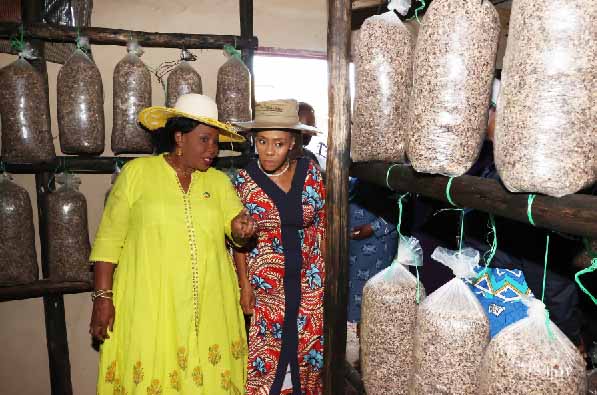
Dr Mnangagwa weighed in with a brief background of Gogo Mberi and how hard work had enabled her to put food on the table and build a decent home for her family.
“I wanted to say to the women in our country and to those who are going to see this programme in Botswana, Ambuya has done a lot here, despite being a widow. She was widowed when she was 29-years-old. Since then she didn’t get married, neither did she gave up in life.
“She continued and told herself that these are my children and I will work for them and she continued. You know what happens when you are a widow. This and that happens. So and so says this, but she got composed and she knew what she wanted to do for the family.
“That is where we are today. She has defied the odds and we have seen the projects that she is doing. She even built a house for her family. God does not give you a problem that you cannot solve don’t forget that. So Ambuya we want to thank you so much.
“Our women, ladies of the night and single mothers should not look down upon themselves. Life is there out there, they need exposure to see what other women are doing. We say come to the programmes and work for your children in an environment which gives you dignity. Women, we need our space of dignity,” Dr Mnangagwa said.
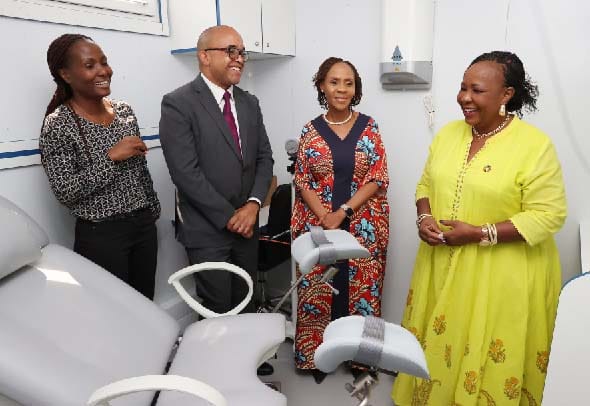
The Director of Food Science and Technology at the Agricultural, Research and Development Institute in Botswana Dr Minah Mmoni Mosele praised Dr Mnangagwa and local scientists for their tangible efforts to uplift the lives of ordinary people using science.
“What we have seen in Zimbabwe for the past two days is how scientists have managed to translate to the level where people at the grassroot level can actually have a livelihood. We have seen science being for the ordinary man on the streets.
“Yesterday we were in the Marondera District. We saw women doing value addition with very basic machinery and equipment that they can find in their kitchens. They made products that they can sell in their own communities.
“They have been able to uplift the lives of their people. We are here today in Harare where we are meeting a 71-year-old widow who is operating a poultry and a small mushroom farm. She is making a lot of money. She is able to look after her family.
“When we look at mushroom farming, someone will think that it’s a very complicated business, but here gogo has shown us that with science being translated to the basic level where an old woman of her age can actually start a mushroom company.
“This shows that in Botswana we still have a lot of work to do. We need to take our science, translate it to the levels where the youths, the uneducated widows, the uneducated single mothers can actually earn a living for themselves and their children,” she said.
The scientist said she was glad Dr Mnangagwa had made even those who cannot read and write use science in accomplishing their daily tasks.
“We have learnt so much and I believe this is a challenge for us as scientists in general in Botswana that our science should not just be science which is for those people that can read and write, but even those people that are on the streets to enable them to make a living out of the science that we bring.
“Technology transfer is not for those who have the money. Here in Zimbabwe we can see that technology transfer and food processing is not for those that are having the money, but is those that have the passion, people that want to move their country.
“In Zimbabwe they say they are building their own country and I believe this is something that we can learn.
“One of the lessons that we can learn today from gogo is that she said a broken crayon can still colour meaning that whether you are a widow, whether you are a single mother whether you are an orphan whether you are a fatherless or a motherless child, whether you are unemployed, whether you come from an underprivileged background you can still make a life out of yourself because being broken means that you can survive the odds and make something out of your life,” she said.
Similar words were echoed by Mrs Tsholo Makgado, a member of the Women Mowana Product Project from Maboiwe Village in Botswana.
“I am here representing a team of women who are in a cooperative where elderly and young women are together trying to map the way forward to better their lives and I am here with a fellow member of the cooperative organisation.
“What we are doing is to actually learn how we can upskill the ideas that we have.
“We have baobab trees and we are really seeking help and skill to develop our products. Currently we produce yoghurt but there is much more we can do with baobab fruit like what we have seen here in Zimbabwe,” she said.
The delegation also saw the First Lady’s bus she received from the President of Belarus and the Angel of Hope Foundation mobile clinic which she uses in her medical outreach programmes to ensure everyone, including people in hard to reach areas, have access to health checks including screening for all cancers.
Mrs Masisi described the approach as impressive and shared that she had also been appointed a health champion to promote cancer screening in her home country hence the need to learn more from Amai Mnangagwa.
“This is very impressive. I had never seen a mobile hospital myself but when you look at a typical woman in our country this is what would work best for a typical patient because the woman is under financial stress.
“Sometimes just travelling to the city to get medical help is not possible so these two (mobile hospital and mobile clinic) are certainly going to have a bearing on our health outcomes.
“This is a plus for Zimbabwe. It is very timely that I went to see both because now you know with the non communicable diseases burden in our countries, we just saw a mammogram station and a station where you can screen for cervical cancer.
“The bus also is amazing. Both these two are very timely because right now in my country the ministry of health has appointed me a champion for cervical cancer where the crux of the matter is we want the uptake of screening to go higher.
“Now if you are able to go out there giving women access to screening services like what Amai is doing, that is a plus. So this is remarkable. I just say congratulations to the First Lady of Zimbabwe Dr Auxillia Mnangagwa she is doing great things,” Mrs Masisi said. – Herald
